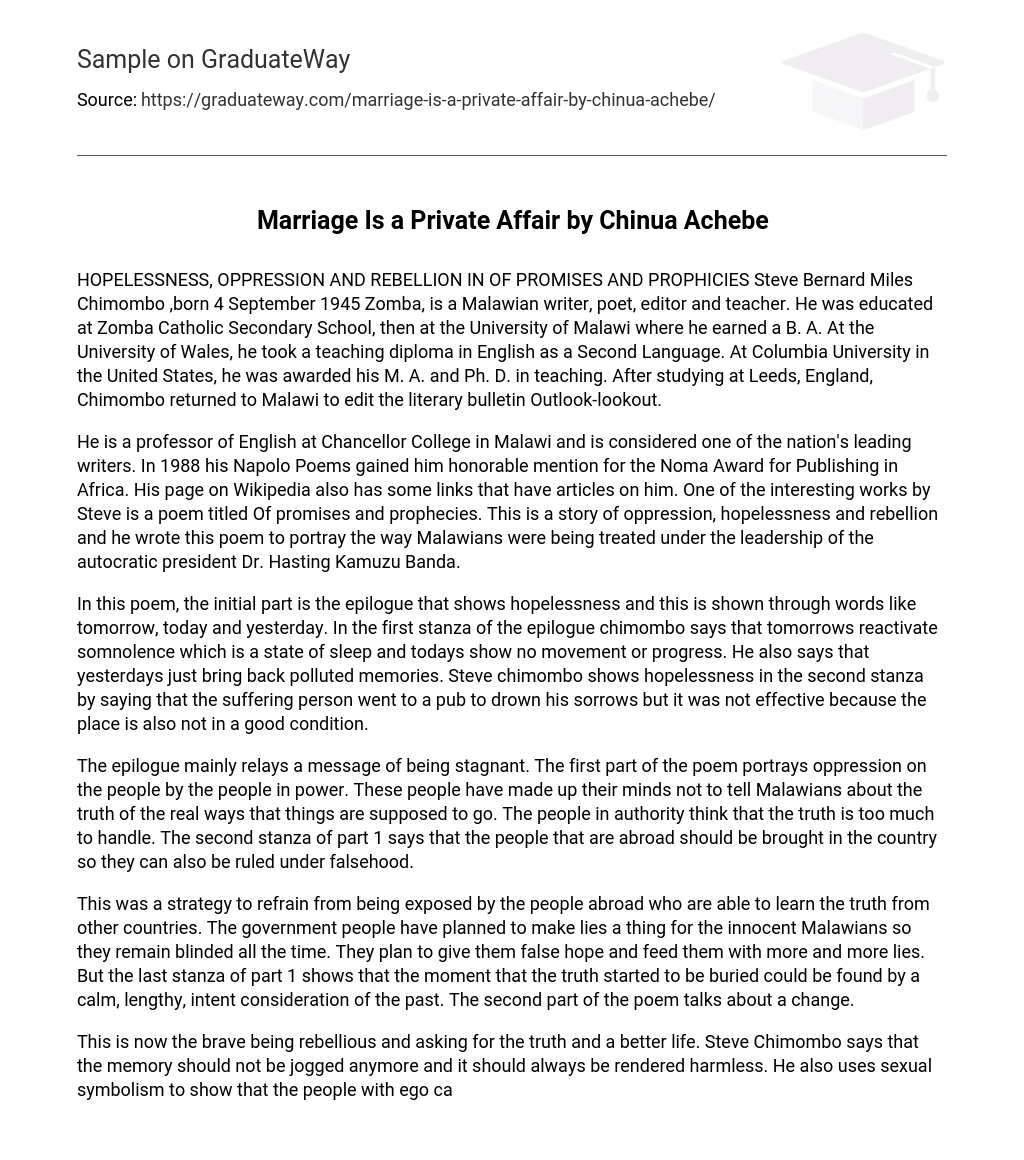HOPELESSNESS, OPPRESSION AND REBELLION IN OF PROMISES AND PROPHICIES Steve Bernard Miles Chimombo ,born 4 September 1945 Zomba, is a Malawian writer, poet, editor and teacher. He was educated at Zomba Catholic Secondary School, then at the University of Malawi where he earned a B. A. At the University of Wales, he took a teaching diploma in English as a Second Language. At Columbia University in the United States, he was awarded his M. A. and Ph. D. in teaching. After studying at Leeds, England, Chimombo returned to Malawi to edit the literary bulletin Outlook-lookout.
He is a professor of English at Chancellor College in Malawi and is considered one of the nation’s leading writers. In 1988 his Napolo Poems gained him honorable mention for the Noma Award for Publishing in Africa. His page on Wikipedia also has some links that have articles on him. One of the interesting works by Steve is a poem titled Of promises and prophecies. This is a story of oppression, hopelessness and rebellion and he wrote this poem to portray the way Malawians were being treated under the leadership of the autocratic president Dr. Hasting Kamuzu Banda.
In this poem, the initial part is the epilogue that shows hopelessness and this is shown through words like tomorrow, today and yesterday. In the first stanza of the epilogue chimombo says that tomorrows reactivate somnolence which is a state of sleep and todays show no movement or progress. He also says that yesterdays just bring back polluted memories. Steve chimombo shows hopelessness in the second stanza by saying that the suffering person went to a pub to drown his sorrows but it was not effective because the place is also not in a good condition.
The epilogue mainly relays a message of being stagnant. The first part of the poem portrays oppression on the people by the people in power. These people have made up their minds not to tell Malawians about the truth of the real ways that things are supposed to go. The people in authority think that the truth is too much to handle. The second stanza of part 1 says that the people that are abroad should be brought in the country so they can also be ruled under falsehood.
This was a strategy to refrain from being exposed by the people abroad who are able to learn the truth from other countries. The government people have planned to make lies a thing for the innocent Malawians so they remain blinded all the time. They plan to give them false hope and feed them with more and more lies. But the last stanza of part 1 shows that the moment that the truth started to be buried could be found by a calm, lengthy, intent consideration of the past. The second part of the poem talks about a change.
This is now the brave being rebellious and asking for the truth and a better life. Steve Chimombo says that the memory should not be jogged anymore and it should always be rendered harmless. He also uses sexual symbolism to show that the people with ego can give false impression as same as onanism that can be deceiving. Steve says that we should just get rid of the people that still want to rule. He advises on giving the Malawians education on the ideologies so that their emotional sufferings can be healed.
In the fourth stanza of the second part, he suggests that an opportunity should also be given to the citizens that are normally looked down upon by the society. He says the beggars, peasants and vagrants should be armed with pleas and canned laughter and change the image of some things in the societies to give the people hope. The last stanza of part two asks questions of mockery to the people with authority. The questions show that the new strategy to disturb the people’s minds has been destroyed by empowering the people.
The epilogue is a continuation of the rebellious plan to change the system of leadership in Malawi. He speaks of destroying the citadel and rebuilds it in three days like the way Jesus did in the past by dying on the cross. The three days mention is just a metaphor of the time he spent abroad learning new things and he shows confidence that he is prepared for his plan. Steve Chimombo talks of a change after the three days and this is shown in the second stanza of the epilogue where he mentions sprouting of a luxurious green gold garden with patches of nice cars.
He continues to show his confidence in his plan in the last stanza by saying that he is armed with a multi-pronged plan Man-Against-Self-and Society (MASS) which he will use to bring back hope to the people. In this story, chimombo has an interesting way of showing these three points. He seems to be open about the criticism and yet it is still closed. This kind of cryptic criticism was necessary to help open the Malawians’ eyes. The power of challenge that was presented in this poem is very effective because it pin points all the crucial issues of concern that the Malawians had back in the days.





